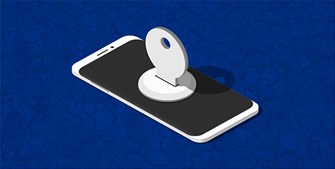As technology advances, so does the use of smartphones. How cool is it to be able to do just about anything online, while on the go? These devices are becoming more commonplace, and the number of mobile phone users around the globe is expected to exceed the 5 billion mark in 2019. Most people don’t leave home or work without having their phone in tow.
Whether it’s calling your coworker, checking your bank account or sending a quick email, smartphones have become the one-stop-shop for conducting business. Now, more than ever, smart phones are being targeted by cybercriminals due to their part in multifactor authentication to access computers, mobile banking and shopping accounts. These accounts often hold sensitive data, credit card information (PCI) and personally identifiable information (PII). As we move into a digital era for the home closing process, smartphones have become another place to review sensitive documents ahead of signing. With such important information being viewed and sometimes stored on your phone, it has become even more vital that you keep your phone secure.
It may be surprising, but the largest risk to your phone security isn’t hackers, it’s you. Forgetting your phone at the table when you leave a restaurant, losing it at the airport or having it plucked from your purse are far more likely scenarios than getting hacked. However, hacking devices is on the rise too, and your phone security strategy should take that into account. Activating the lock screen feature on all your devices is a good place to start. The screen automatically locks when the device is not in use, and it requires a passcode, fingerprint or facial recognition to unlock it. This step helps to ensure that no one can access your device if it is lost or stolen.
Here are some other great tips to help secure your mobile device:
- Ensure your phone is always running the latest version of its operating system and apps by enabling automatic updates. These updates often are meant to fix security weaknesses in the software to reduce its chance of being hacked.
- When downloading apps to your phone, only use trusted sources such as the Apple App Store, Google Play or the Amazon Appstore. Don’t trust every app on these stores, either. Many apps ask for overly broad permissions, are brand new and not fully tested, or are no longer updated, which could expose you to security vulnerabilities. Be sure to check reviews and for active updating before downloading an app.
- Download a credible antivirus app recommended by a trusted source. Your device should be treated just like a computer and protected that way as well.
- Many phones today come with software you can enable to remotely track your device if it’s lost or stolen. Even if your phone doesn’t come with this feature, or you would like expanded security options, there are many anti-theft apps available. These apps range from simply pinging your phone’s location to being able to remotely lock and wipe all content from it.
- Regularly backing up your data is a great strategy to retain your information. Many phones allow you to set up an automatic backup to store photos, messages, apps and more. Knowing this information is backed up will make it easier to choose to remotely wipe your phone, if needed.
Overall, mobile devices add productivity and flexibility by providing access to resources at any time, from anywhere. Smartphones are becoming our constant companions, so we need to stay vigilant when it comes to mobile security.




